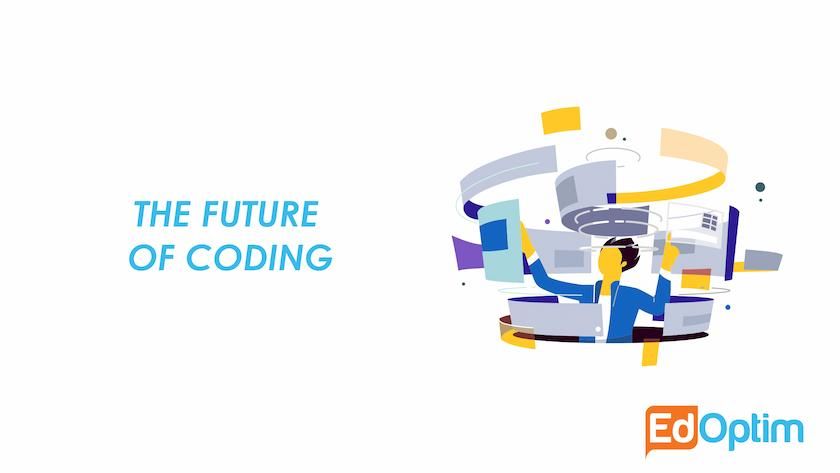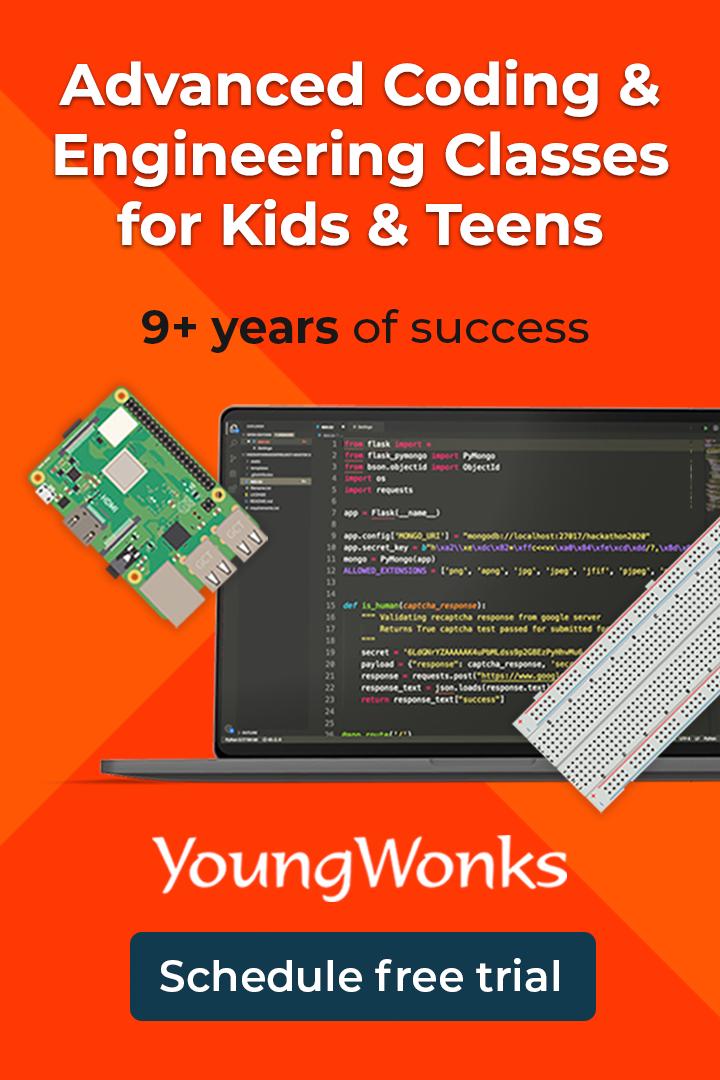Oct 10, 2024 By Team YoungWonks *
Artificial Intelligence and Machine Learning Integration
Artificial intelligence (AI) and machine learning (ML) have already made their mark on various industries, and their influence on software development will only continue to grow. In the next decade, AI will not just assist coders but may begin to write code autonomously, solving problems and even optimizing algorithms.
Generative AI in Coding: AI models like OpenAI’s Codex have shown their potential in generating code snippets from natural language descriptions. Programmers of the future will increasingly collaborate with AI-powered tools to automate mundane coding tasks, detect bugs, and improve overall code quality.
Machine Learning-Driven Solutions: Software solutions will rely heavily on ML algorithms to create adaptive, intelligent programs that can predict user behavior and automate complex tasks. This will also require programmers to become proficient in data science, leveraging Python and other ML-centric programming languages.
Low-Code and No-Code Platforms
One of the most significant trends on the horizon is the rise of low-code and no-code platforms. These tools allow individuals with little to no programming experience to develop functional applications using a drag-and-drop interface. As a result, software development may become more accessible to beginners and professionals outside traditional computer science backgrounds.
Empowering Non-Programmers: While these platforms won’t replace expert coders, they will democratize coding, allowing more individuals to create apps and automate processes. As automation becomes a central theme in the development process, these platforms will augment the efficiency of existing workflows.
Impact on Programmers: Programmers may spend less time writing boilerplate code and more time focusing on complex system architecture, integration, and cybersecurity. However, they will still be needed to build and maintain the core frameworks on which these platforms operate.
Quantum Computing
The next decade may see the dawn of quantum computing, revolutionizing the way we solve problems. Quantum computers use the principles of quantum mechanics to process information at unprecedented speeds, potentially cracking cryptographic algorithms and solving problems that classical computers could never manage.
Impact on Software Development: Programming languages and algorithms will need to evolve to leverage quantum capabilities. Languages like Python and emerging quantum-specific languages such as Q# from Microsoft are already exploring this field. Quantum computing will have a profound impact on industries such as cryptography, cybersecurity, and complex problem-solving.
Emergence of New Programming Languages
While classic languages like Python, Java, and JavaScript will remain dominant, the next decade will see the rise of new coding languages that cater to the evolving demands of software development. Rust, for example, is gaining popularity due to its memory safety and performance benefits, while Kotlin is becoming the language of choice for Android developers.
Adapting to New Paradigms: The future will demand that programmers adapt to new paradigms that may focus on secure, scalable, and parallelized processing. Languages that support multi-threading and are optimized for cloud environments will likely gain traction.
Advancements in Cybersecurity
As cyberattacks become more sophisticated, cybersecurity will be a primary concern for developers. Programmers will need to incorporate security into every aspect of the development process, from writing secure algorithms to using frameworks that protect against vulnerabilities.
AI and Cybersecurity: Machine learning and AI will be key in detecting and preventing cyber threats. In the future, developers will rely on AI-driven security tools that monitor, identify, and neutralize threats in real-time. Secure coding practices will become the norm, and developers will need to stay ahead of constantly evolving threats.
Web Development and Cloud Computing
Web development will continue to thrive in the next decade, but it will be heavily influenced by cloud computing and DevOps. The shift toward serverless architectures will enable developers to focus more on writing code and less on managing infrastructure.
Scaling Web Applications: The need to scale applications quickly and efficiently will push developers to build web apps that are inherently cloud-native. DevOps methodologies will become even more integral to ensure seamless development, testing, and deployment cycles.
The Role of Open-Source in Development
Open-source software has long been a key part of the development community, and its role will continue to grow. Platforms like GitHub will remain central to collaboration, where developers share, improve, and build upon existing projects. The next decade may also see the rise of open-source frameworks for AI, quantum computing, and more.
Contribution to Open-Source: Beginners and experienced coders alike will benefit from contributing to open-source projects. It provides an opportunity to learn, network, and improve one's coding skills. As more companies embrace open-source solutions, it will fuel faster innovation and reduce development costs.
Rise of IoT and Edge Computing
The Internet of Things (IoT) will connect billions of devices, from smart homes to healthcare systems, resulting in an ever-growing demand for real-time data processing. Programmers will have to adapt to developing software for devices that operate at the edge of the network, with constraints in memory, power, and computational capacity.
Edge Computing Challenges: Writing code for IoT devices and edge computing environments requires an understanding of optimized algorithms that can handle real-time processing with limited resources. This will also impact how cloud computing and data pipelines are designed, offering new opportunities in software engineering.
Interactive Coding and Learning Tools
As coding becomes more essential, interactive tools and platforms will emerge to make learning to code easier and more effective. Interactive tutorials, real-time feedback loops, and gamified learning experiences will be commonplace, enabling both beginners and experienced developers to upskill continuously.
LinkedIn and Other Platforms: Learning platforms, including LinkedIn, will evolve with more interactive and problem-solving focused modules, making it easier for developers to stay updated with the latest in coding languages and technologies.
The Intersection of Programming and Healthcare
One area where software development will have a significant impact is healthcare. The increasing use of machine learning algorithms and AI in diagnosing diseases, as well as the rise of personalized medicine, will create demand for specialized coding knowledge in this field.
Developing for Healthcare: Programmers will be instrumental in creating healthcare applications that leverage real-time data, patient history, and AI to improve diagnostics and treatment. Blockchain technology may also find use in securing sensitive medical data, while virtual reality (VR) will enhance medical training.
Conclusion
The next decade of coding will be defined by rapid advancements in technology, with automation, AI, and quantum computing leading the charge. As new programming languages and development methodologies emerge, programmers will need to continuously upskill to remain relevant in this evolving landscape. Whether you're a beginner or an experienced coder, the future promises to be an exciting era of innovation and discovery in software development. Keep exploring, stay curious, and get ready to code the future!
FAQs
Frequently Asked Questions (FAQs)
What will be the future of coders?
The future of coders looks promising as technology continues to advance and new fields emerge. Programmers will find themselves working with a growing range of tools, from AI-driven development environments to low-code platforms. As software development becomes even more critical across industries, coders who continually adapt to new technologies will find plenty of opportunities.
Will coding be obsolete in the next 5 years?
No, coding will not be obsolete in the next five years. While AI and automation are simplifying some aspects of coding, they are also creating new demands and areas for software development. Coders will likely need to work alongside AI tools, focusing on complex problem-solving, security, and innovation, which require human input.
Will coding still be relevant in 2025?
Absolutely. Coding will continue to be relevant in 2025 and beyond. With the expansion of AI, machine learning, IoT, and data science, coding skills will remain essential. The nature of coding jobs may evolve, but the core skills of problem-solving and software development will remain valuable.
Will coding jobs be taken over by AI?
While AI will automate certain coding tasks, it’s unlikely to completely take over coding jobs. Instead, it will change the role of coders, shifting them towards tasks that require creativity, critical thinking, and strategic planning. Coders will also be needed to build, maintain, and improve the AI tools themselves.
Is AI replacing software engineers?
AI is not replacing software engineers but rather transforming the way they work. Engineers are increasingly using AI to enhance productivity, automate repetitive tasks, and optimize code. However, the design, development, and strategic planning behind software projects will continue to require human expertise.
Will ChatGPT replace programmers?
ChatGPT and similar AI tools can assist programmers by providing code suggestions, debugging, and automating simple tasks. However, programming involves much more than writing code. It requires an understanding of design principles, system architecture, and user needs—areas where human insight and creativity are essential.
*Contributors: Written by Shankar V; Edited by Alisha Ahmed; Lead image by Shivendra Singh

